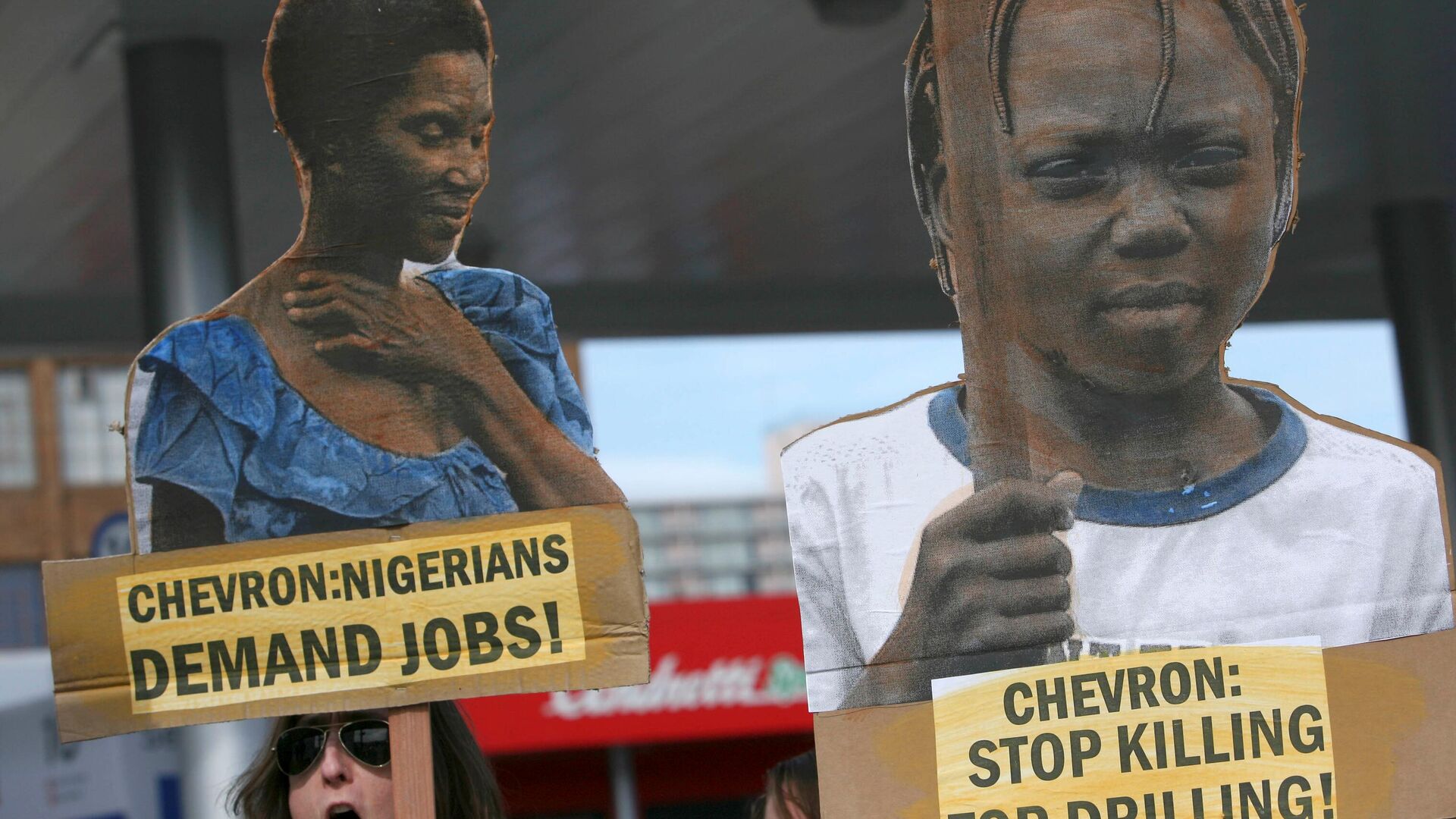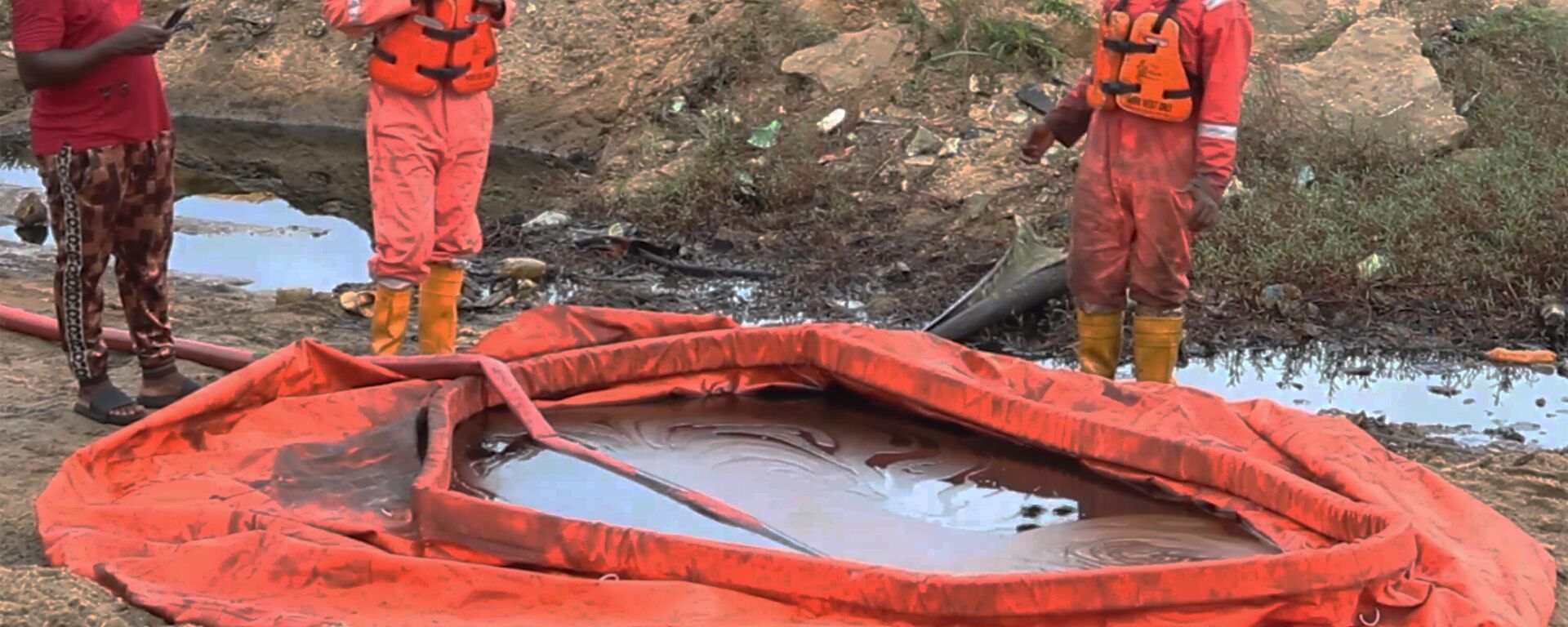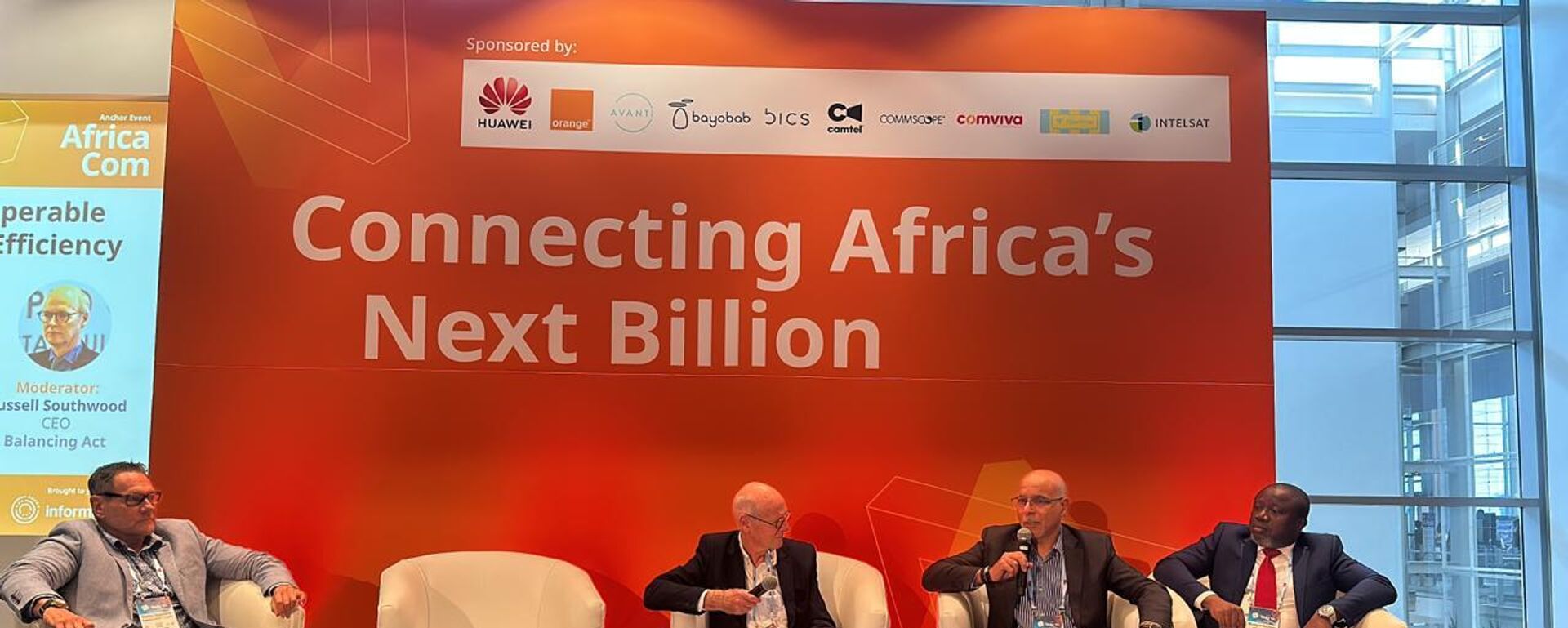https://en.sputniknews.africa/20240417/we-cant-continue-being-slaves-in-our-homeland-nigerias-itsekiri-on-reasons-to-fight-chevron-1066101767.html
'We Can’t Continue Being Slaves in Our Homeland': Nigeria’s Itsekiri on Reasons to Fight Chevron
'We Can’t Continue Being Slaves in Our Homeland': Nigeria’s Itsekiri on Reasons to Fight Chevron
Sputnik Africa
The Itsekiri are one of the peoples of Nigeria living in the incredibly oil-rich Niger Delta, and one of the largest energy companies in the country, Chevron... 17.04.2024, Sputnik Africa
2024-04-17T16:23+0200
2024-04-17T16:23+0200
2024-04-18T10:43+0200
opinion
nigeria
united states (us)
sputnik africa
interview
oil
neocolonialism
exploitation
west africa
employment
https://cdn1.img.sputniknews.africa/img/07e8/04/11/1066112367_0:171:3034:1878_1920x0_80_0_0_283ac2dd06adc17ef30422116e91a31b.jpg
To fight this discrimination, Nigeria's National Association of Itsekiri Graduates (NAIG) is planning to start protesting against US petroleum giant Chevron as the Itsekiri people "cannot continue to be slaves in our homeland," Collins Edema, ex-president of the NAIG and the sole representative of the Olu of Warri (King of Warri Kingdom) to the Nigerian National Petroleum Corporation told Sputnik Africa in an interview.But let us dive deeper into the reasons behind the Itsekiri people's grievances. One of them was that the oil giant hired locals as "trainees" and not as staff, paying them less than $10 allowance a day, even though they were doing the same work as the company's workers, who in turn received almost tens of times more money, Edema said. Moreover, Itsekiri had to continue to work based on trainee contracts, although they should have been employed on standard contracts with higher salaries after completing the training.Thus, the NAIG began to fight for the compatriots, including by writing a complaint to the Nigerian government, which condemned the company’s behavior and demanded that normal contracts be concluded with the "trainees." The company ignored this demand and continues to do so.Furthermore, in 2014, Chevron's Escravos Gas-to-Liquids Project began operating on the local people's land, which also caused outrage from the Itsekiri people because, instead of hiring the locals, the company carried out a secret recruitment of workers from other parts of Nigeria, which meant that the Itsekiri people did not even have the opportunity to try to apply for a job in the new plant.Edema explained that the Nigerian Oil and Gas Content Development Act, 2010 requires all oil companies in Nigeria to "give a reasonable part of employment opportunity" to people from the host communities, which, in the case of Chevron, is the Itsekiri.The discussion of this issue brought up the bigger topic of the overall obligations that international companies have to local communities. According to Ben Eburajolo, the acting National President of the NAIG, such companies have to provide people with everything they need for a decent living: electricity, clean water, medical facilities, employment and work skills training.Eburajolo continued, saying that Chevron has "failed in all of their corporate social responsibilities" as there are no good schools, no medical facilities, no potable water and the people are not employed in the Itsekiri area.Exploiting resources and giving nothing in return sounds like neocolonialism, right? That's what Edema pointed out further, comparing such practices to slavery. Chevron is only interested in making money in Nigeria and doesn't care about the locals, which is a 180 from what the company is doing in other countries where they have operating facilities. The only difference is that those countries are European.But how can Africans fight such injustice? Answering this question, Edema advocated for union between Africans and urged them to "shun selfishness and greed."Eburajolo, in turn, blamed African leaders and the Nigerian government in particular for not "standing up and defending [their] citizens from these international oil companies."The NAIG's head added that this inaction of the government and African leaders is precisely the reason why the locals started to fight for their rights on their own.Wrapping up the interview, both guests reminded the international community that Itsekiri are going to fight for their rights using peaceful and legal means.
https://en.sputniknews.africa/20240228/shell-must-address-pollution-before-exiting-niger-delta-think-tank-urges-1065296040.html
https://en.sputniknews.africa/20231114/african-countries-unite-sadc-ministers-call-for-tech-collaboration-for-continents-growth-1063541669.html
nigeria
united states (us)
west africa
niger
Sputnik Africa
feedback@sputniknews.com
+74956456601
MIA „Rossiya Segodnya“
2024
Christina Glazkova
https://cdn1.img.sputniknews.africa/img/07e7/0b/07/1063380906_0:0:673:674_100x100_80_0_0_79628b4d0cd9f29291a57aa13bbf9e7a.jpg
Christina Glazkova
https://cdn1.img.sputniknews.africa/img/07e7/0b/07/1063380906_0:0:673:674_100x100_80_0_0_79628b4d0cd9f29291a57aa13bbf9e7a.jpg
News
en_EN
Sputnik Africa
feedback@sputniknews.com
+74956456601
MIA „Rossiya Segodnya“
Sputnik Africa
feedback@sputniknews.com
+74956456601
MIA „Rossiya Segodnya“
Christina Glazkova
https://cdn1.img.sputniknews.africa/img/07e7/0b/07/1063380906_0:0:673:674_100x100_80_0_0_79628b4d0cd9f29291a57aa13bbf9e7a.jpg
nigeria, united states (us), sputnik africa, interview, oil, neocolonialism, exploitation, west africa, employment, social, africa in details, niger
nigeria, united states (us), sputnik africa, interview, oil, neocolonialism, exploitation, west africa, employment, social, africa in details, niger
'We Can’t Continue Being Slaves in Our Homeland': Nigeria’s Itsekiri on Reasons to Fight Chevron
16:23 17.04.2024 (Updated: 10:43 18.04.2024) Christina Glazkova
Writer / Editor
Longread
The Itsekiri are one of the peoples of Nigeria living in the incredibly oil-rich Niger Delta, and one of the largest energy companies in the country, Chevron Nigeria Limited, operates on their lands. Receiving multimillion-dollar profits from oil development in southern Nigeria, the company seems to be giving Itsekiri almost nothing in return.
To fight this discrimination, Nigeria's National Association of Itsekiri Graduates (NAIG) is planning to start protesting against US petroleum giant
Chevron as the Itsekiri people "cannot continue to be slaves in our homeland,"
Collins Edema, ex-president of the NAIG and the sole representative of the Olu of Warri (King of Warri Kingdom) to the Nigerian National Petroleum Corporation told
Sputnik Africa in an interview.
"We cannot continue to be slaves in our homeland. [...] We are going to do everything within the ambit of the law to ensure that our voices are heard. Chevron oppression is [grounded] in Itsekiri land," Edema said.
But let us dive deeper into the reasons behind the Itsekiri people's grievances. One of them was that the
oil giant hired locals as "trainees" and not as staff, paying them less than $10 allowance a day, even though they were doing the same work as the company's workers, who in turn received almost tens of times more money, Edema said. Moreover, Itsekiri had to continue to work based on trainee contracts, although they should have been employed on standard contracts with higher salaries after completing the training.
Thus, the NAIG began to fight for the compatriots, including by writing a complaint to the
Nigerian government, which condemned the company’s behavior and demanded that normal contracts be concluded with the "trainees."
The company ignored this demand and continues to do so."They have kept them in slave labor despite being qualified, despite doing the same jobs their staffs were doing, and the House committee chairman slammed Chevron and asked Chevron to give them proper contracts. Until we speak, they gave them just a poor contract, where they are paid just a little above what they were earning before," Edema said.
Furthermore, in 2014, Chevron's Escravos Gas-to-Liquids Project began operating on the local people's land, which also caused outrage from the Itsekiri people because, instead of hiring the locals, the company carried out a secret recruitment of workers from other parts of Nigeria, which meant that the Itsekiri people did not even have the opportunity to try to apply for a job in the
new plant.
But is Chevron required by law to provide local jobs? In fact, it is.
Edema explained that the Nigerian Oil and Gas Content Development Act, 2010 requires all oil companies in
Nigeria to "give a reasonable part of employment opportunity" to people from the host communities, which, in the case of Chevron, is the Itsekiri.
"[...] By the Nigerian Oil and Gas Development law Act of 2010, Chevron is mandated to give a reasonable percentage of every employment to Itsekiri people," Edema said.
The discussion of this issue brought up the bigger topic of the overall obligations that international companies have to local communities. According to
Ben Eburajolo, the acting National President of the NAIG, such companies have to provide people with everything they need for a decent living:
electricity, clean water, medical facilities, employment and
work skills training.
"The responsibility is to provide us corporate social responsibility, to provide potable water, good health care facility, electricity. [...] Train our people in vocational skills, and employ us. This one is [a] must. They must employ 60% of their host community. [...] I see no reason why Chevron would take a right that belongs to us and give it to the outside world. I call it the outside world because once it leaves the community, it becomes the outside world," he told Sputnik Africa.
Eburajolo continued, saying that
Chevron has "failed in all of their corporate social responsibilities" as there are no good schools,
no medical facilities, no potable water and the people are not employed in the Itsekiri area.
Exploiting resources and giving nothing in return sounds like
neocolonialism, right? That's what Edema pointed out further, comparing such practices to
slavery.
Chevron is only interested in making money in Nigeria and doesn't care about the locals, which is a 180 from what the company is doing in other countries where they have operating facilities. The only difference is that those countries are
European.
"Chevron corporate headquarters in San Ramon [a city in California, US] is only interested in the profits they make from Nigeria, not interested in the welfare of the community. [...] We don't share any part of their profits from the sales of oil in our land. [...] So yes, Western companies, really probably doing another form of neocolonialism in this part of the world," Edema argued.
But how can
Africans fight such injustice? Answering this question, Edema advocated for union between Africans and urged them to "shun selfishness and greed."
"I think the first thing is for Africa to be united. Unfortunately, even though we have the AU [African Union], Africa is not really united [...]. Africa really needs to shun discrimination. Shun selfishness, greed. The average African man takes opportunity of his fellow brothers. That's why we could sell ourselves into slavery. [...] Probably because of so much poverty [...]," he pondered.
Eburajolo, in turn, blamed African leaders and the Nigerian government in particular for not "standing up and defending [their] citizens from these international oil companies."
"Our leaders shouldn't fold their arms and watch us, citizens, being enslaved, be marginalized and the companies getting away with it," he said.
The NAIG's head added that this inaction of the government and African leaders is precisely the reason why the locals started to
fight for their rights on their own.
"That is the reason we want to take our destinies into our hands by shutting down the oppression of Chevron Nigeria Limited. [...] We've been enslaved for too long, now that we are free from the colonial masters. Are they using these multinationals to start another form of slavery? No, we would not take that because we are free citizens of Nigeria," Eburajolo said.
Wrapping up the interview, both guests reminded the international community that Itsekiri are going to fight for their rights using peaceful and legal means.
"I want the world to know that the security people of Warri Kingdom have been enslaved, marginalized, and oppressed by the Western oil companies. [...] We would do everything within the ambit of the law to get what rightfully belongs to the Itsekiri nation of Warri Kingdom," Eburajolo concluded.




